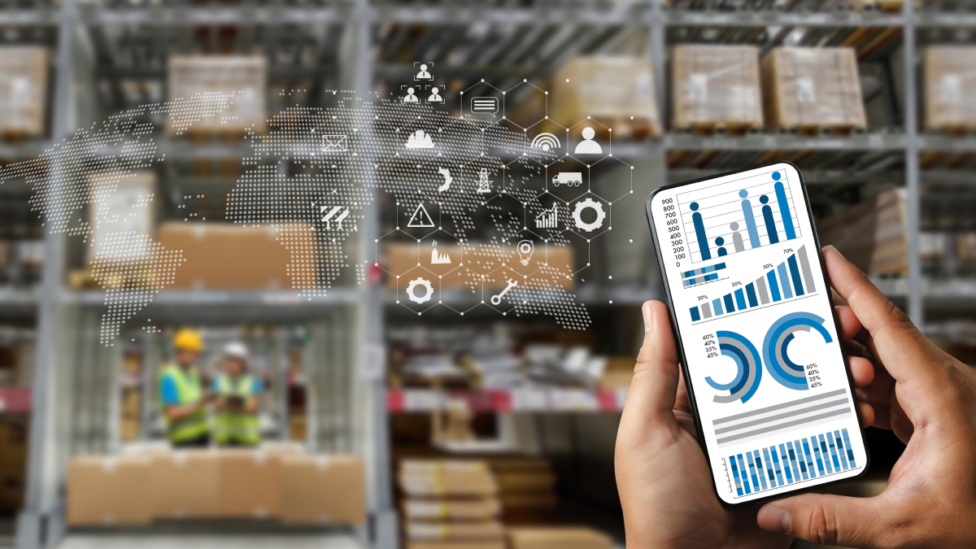Tariffs are on many businesses’ minds these days and for good reason. For businesses involved in global trade, tariffs pose a significant challenge. As United States tariffs go into effect, there is a lot of financial pressure on businesses that rely on imports to survive, impacting everything from the sourcing of raw materials, inventory management, operations and logistics, and prices for consumers.
Adapting to Evolving Global Trade Dynamics
More than economic policy, tariffs can alter how businesses operate. Tariffs can lead to rising costs, disrupt supplier and sourcing relationships, and negatively impact productivity as businesses adapt to changing trade regulations and trading partner relationships.

How AI Can Help You Be More Resilient Against Tariffs
In recent years, artificial Intelligence (AI) has been a game-changer for supply chain management, paving the way for more automation, enhanced decision-making, and optimization at every stage. For businesses looking to reduce tariff pressures, investing in AI might provide a path toward greater resiliency and adaptability.
Here are some ways AI can help to improve supply chain visibility end-to-end:
- Optimize Sourcing Strategies: Analyze vast amounts of data to identify alternative suppliers, evaluate potential costs, and assess supplier reliability.
- Improve Inventory Management: Leverage historical sales data, monitor market trends, and other economic indicators to predict demand more accurately to avoid overstocking, optimize inventory levels, and plan production and distribution better.
- Scenario Planning: Model tariff impacts (or other business challenges) across multiple scenarios to make informed decisions on next steps.
- Streamline Business Processes: Understand what’s happening throughout the supply chain and identify ways to optimize operations, reduce costs and possible downtime.
- Optimize Logistics: Better understand shipping patterns, customs data, and freight costs via AI to minimize costs.
- Enhance Trade Compliance: Scan through free trade agreements to identify trade regulations and clauses that may impact you to avoid penalties.
How AI is Already Helping Multiple Industries
AI is helping many industries be more agile, efficient, and responsive to the changing global marketplace, for example:
- Retail: Manage inventory, forecast demand, optimize pricing, and streamline logistics to ensure the right products are in the right places at the right time.
- Manufacturing: Optimize production schedules, manage inventories, and ensure that facilities are running efficiently.
- Automotive: Predict supply and demand for parts to optimize logistics and ensure efficient production schedules.
- Pharmaceuticals and Healthcare: Optimize sourcing of raw materials, medications, and medical devices and forecast demand for drugs, predict inventory shortages, and optimize distribution networks.
- Food and Beverage: Better forecast demand, reduce waste and prevent spoilage, optimize production lines, and improve delivery logistics.
- Logistics and Shipping: Manage transportation routes, monitor fuel usage, and track shipments in real-time to minimize disruptions, pre-plan maintenance, and improve last-mile delivery.
- Electronics: Forecast demand, streamline production scheduling, manage component suppliers, and predict potential disruptions in the supply chain.
- Construction: Procure materials, ensure timely delivery, reduce delays related to shortages, and manage day-to-day logistics.
- Consumer Goods: Optimize production and logistics processes, forecast demand, and track the supply of raw materials.
Think of AI as an Essential Business Tool
The current tariff environment is not a static condition but an evolving dynamic. Businesses that demonstrate agility, strategic thinking, and innovative problem-solving can successfully navigate this complex landscape. Tomorrow’s supply chains will look different than those of today — more distributed, more technologically driven, and more adaptive.
AI is an investment in supply chain resilience that can help you:
- Improve decision making using real-time insights to respond quickly to changing trade policies and/or market conditions.
- Reduce costs by optimizing logistics and driving inventory management efficiencies.
- Compete globally by delivering for customers despite external pressures.
OpenText B2B Integration and Aviator IoT can help your business transform supply chain visibility and gain actionable insights. As global trade evolves, AI can help you reduce business risks and position you for long-term growth. Contact us to learn more.




